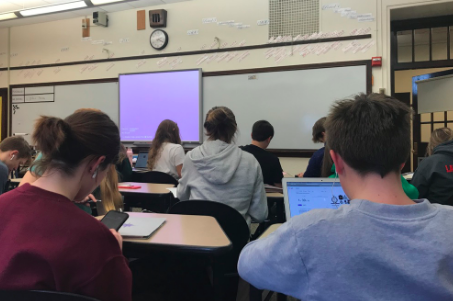Double tap
Students discuss social media and how it affects their well-being

Scrolling by: Right before the bell, students Quinn Brigner (10) and Patrick Sullivan (10) spend time on their devices, rather than conversing with one another.
Whether it be a source of entertainment or a method of organization, technology has become more and more prevalent over the past decade. Today’s teenagers are assumed to interact with technology the most, for they have grown up with it.
Research proves this assumption to be true; according to Pew Research Center, 45% of teenagers are on the internet almost constantly. In a survey consisting of the high school student body, the average screen time, which is composed of time spent on all electronic devices, is between four and six hours.
“Once I start looking at something on social media, I’ll keep scrolling to look at other stuff,” Azalea Biteau (10) said. “Without realizing, half an hour has already passed where I could’ve been doing something else.”
Although students spend a great amount of their time on the internet and social media, there is still a debate among the student body on whether this exposure benefits them or not. A survey was sent out to the student body regarding their opinions on social media. Of the 56 respondents, 29 said that the effects of the internet are more positive, while 27 said that the effects are more negative, making both sides of this debate pretty even.
Those who believe the internet brings more positive effects to society say social media provides methods of organization, as well as ways to connect with those who wouldn’t be able to be reached otherwise, to the table.
“[Social media] lets me connect to one of my friends who lives in Australia,” Sofia Wiegand (9) said. “It also keeps my learning on point in classrooms and with homework.”
Those on the other half of the discussion feel that social media enables people to compare themselves to others, as well as provide a sense of security in what they say.
“People tend to get lost in the sort of ‘power’ they have in being able to say whatever they want online without any consequence,” Jason Nunery (11) said. “This gets them in some sort of state where they feel this power in the real world, and expect nothing to happen to them if they say something ridiculous and incorrect.”
Some on this side agree with certain points the other party makes. However, there’s a dissimilarity on how much this benefit should be used before it turns into addiction.
“I think it’s alright to use Instagram or Facebook perhaps once a month to genuinely see what friends you don’t interact with everyday are up to,” Shane Pritchard (12) said. “But there’s no reason to check it everyday.”
Many students realize the great amount of time they are spending on the internet, so they restrict their time spent on specific apps or on their phones in general. In addition, some students actively don’t use social media. This proves to decrease the negative effects that their peers usually experience.
“I have been without any social media for almost two weeks,” Lauren Jacomet (11) said. “Now that I have been without it for a while, I have realized I do a lot more with my time, am more productive, and get more sleep.”
Although students recognize the social effects of social media, there are still medical effects impacting students. According to rallyhealth.com, teenagers who spend more time on devices are more likely to develop attention disorders. Also mentioned by rallyhealth.com, a study conducted in Norway concluded that teenagers who spend four or more hours of time on a screen per day are 50 percent more likely to lie awake for an hour before falling asleep.
Technology will continue to evolve, as will the debate on the effects it brings to society. Humans develop and advance technology, now it is up to humans to make it benefit the majority of society.






